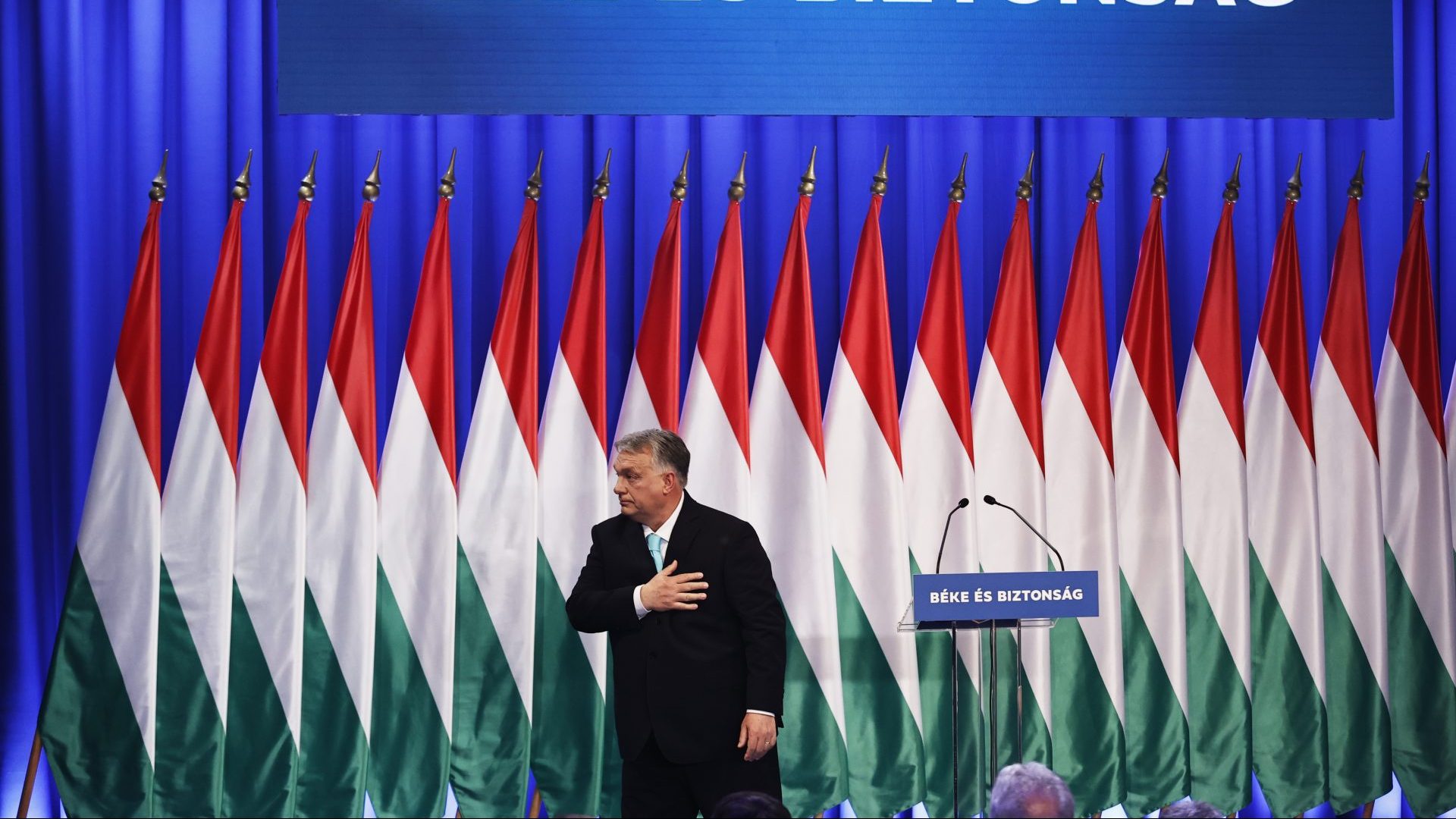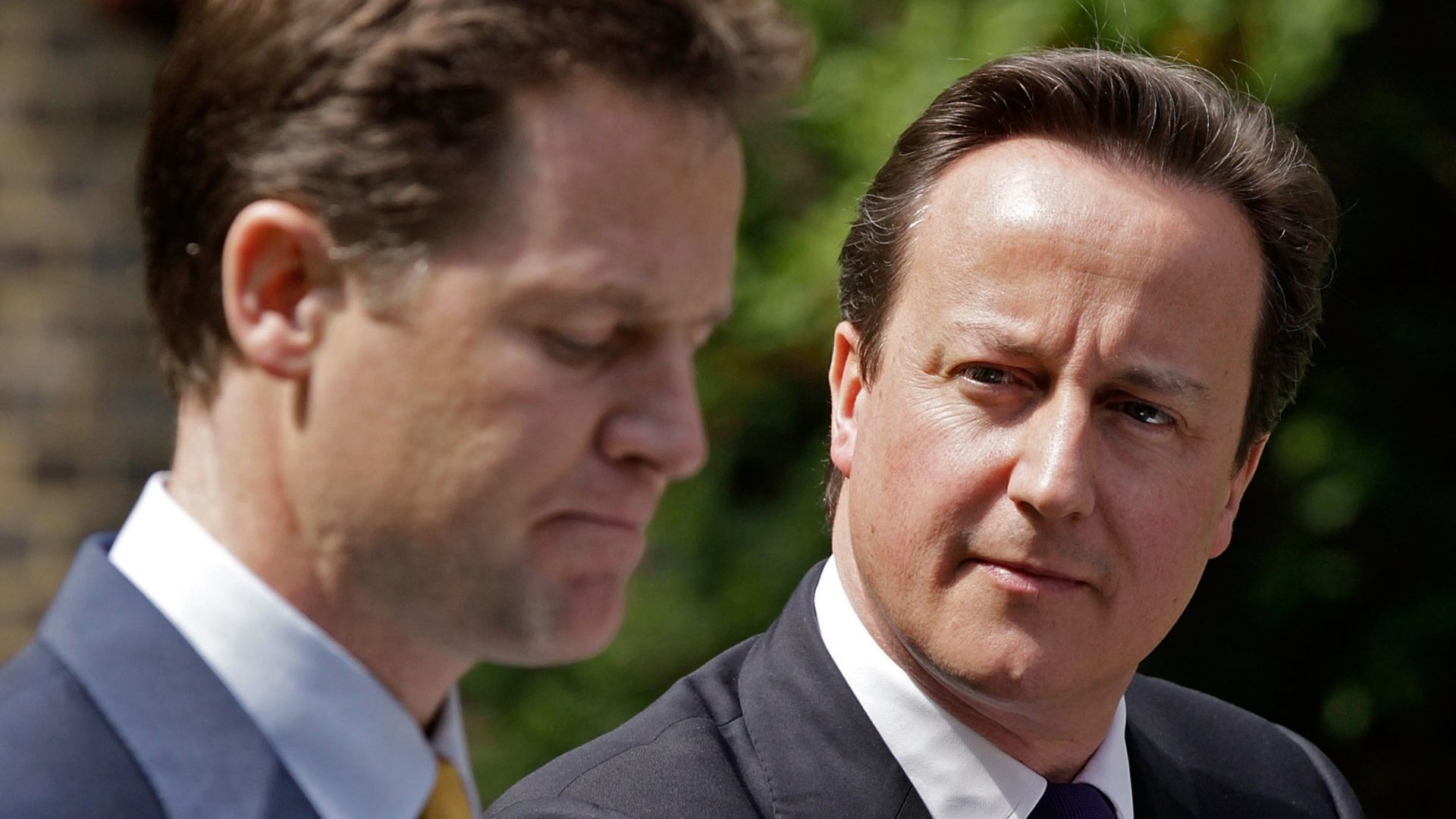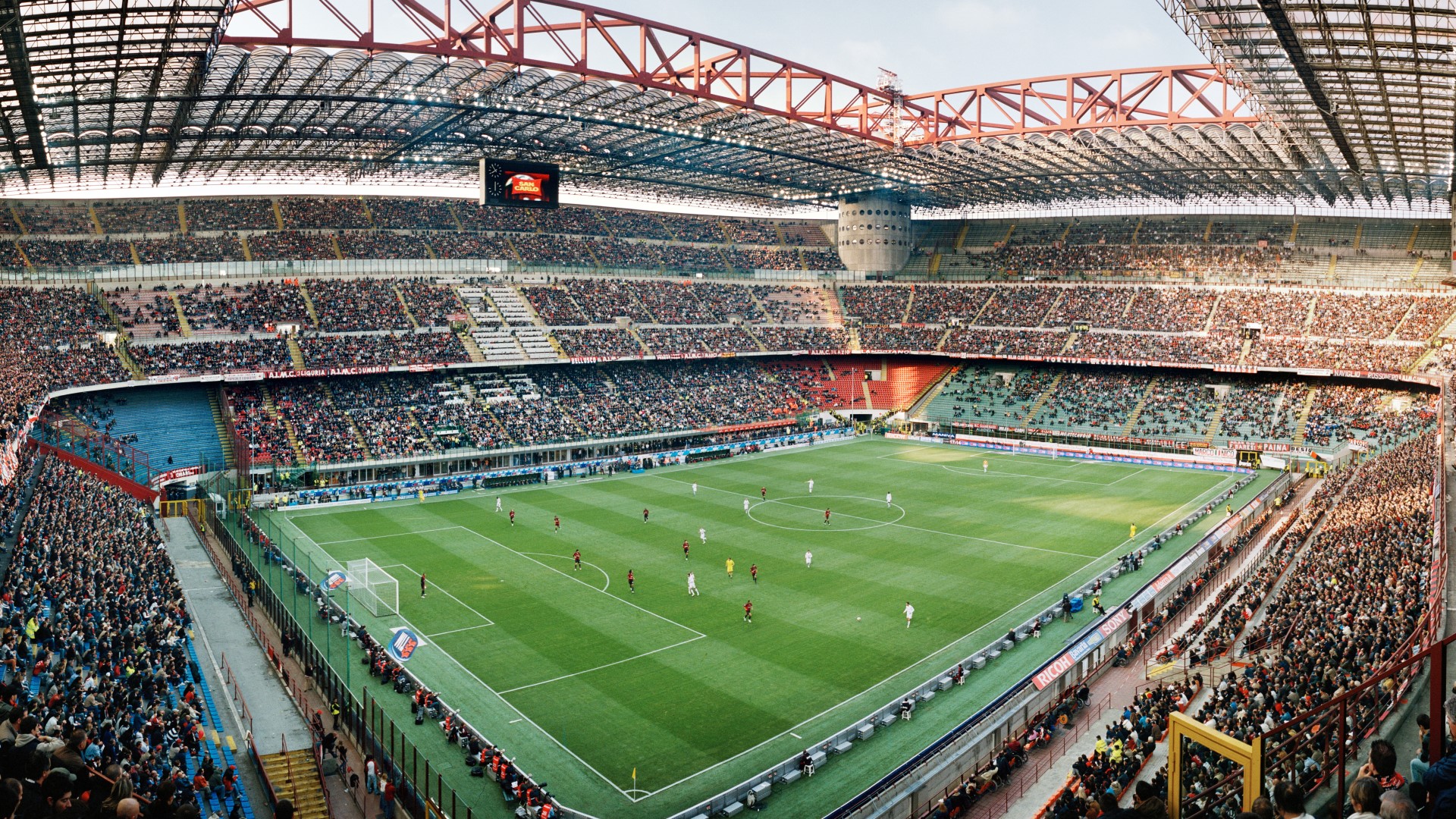Hungary, it says in room one, is stuck between a rock and a hard place. I am in the House of Terror, which begins, with no frills, with the extermination of the Jews during the brief Nazi rule in 1944-45 supported by the local quisling government.
The museum, for two decades an essential component of any tourist’s Budapest itinerary, moves quickly on to the horrors of the much longer Soviet occupation, via an interlude entitled “turncoats” – those who swapped their fascist Arrow Cross uniforms for communist ones.
Each exhibit is carefully curated to portray a country put upon by malign foreign forces. This is not surprising, as its director is one of the chief ideologues behind the prime minister, Viktor Orbán. Like him, she has travelled from anti-communist agitator to right wing authoritarian. Like him, she sees no distinction between the two.
“We cannot fight successfully by liberal means because our opponents use liberal institutions, concepts and language to disguise their Marxist and hegemonic plans,” declared Orbán last year. His audience, the Conservative Political Action Conference in Dallas, greeted him like a rock star.
Sandwiched in the middle of Europe, Hungary contains barely 10 million people. Almost no American would have been able to place it on a map before Orbán came along.
He is more than a leader who has won four general elections. He is the lodestar for the American and global alt-right. He helped to create Donald Trump, and counts Vladimir Putin if not as a friend, then as a useful ally. He loathes everything about the European Union, while soaking up its money.
The dark genius of Orbán is that his methods are hard to detect, to the outsider at least. Budapest during the sunny May Day long weekend was heaving. Restaurants, bars and cafes were doing a brisk trade. Hungary has become a European variant of Singapore or Dubai – unlimited private freedoms, heavily curtailed public freedoms.
Orbán’s political journey began when he obtained a grant from the financier and philanthropist, George Soros, in 1988, to form an anti-communist political party. He called it Fidesz, or Young Democrats, winning his first election as prime minister in 1998. At the time, he was a standard politician of the European centre right.
It all changed when he lost in 2002. For the next eight years in opposition, he developed a deep sense of personal and political grievance, and hired an American consultant to hone his propaganda skills.
He returned to power in 2010 and has stayed there ever since, consolidating his stranglehold on the state and subjugating the judiciary and media with the approval of parliament.
Orbán came under the spell of an American political strategist, Arthur Finkelstein, who schooled him in the early arts of wedge politics and culture-war sloganeering. He identified and went after specific enemies – anyone deemed to be liberal, of the left or inimical to family values. The vilification of his erstwhile mentor, Soros, suggested a certain antisemitism, curious given that Finkelstein was Jewish (and gay) and that one of Orbán’s closest political allies is Benjamin Netanyahu. During the recent demonstrations in Israel over Netanyahu’s power grab against his own judiciary, one of the chants from the protesters was: “Israel is not Hungary; Israel is not Poland.”
Like Netanyahu, like Trump, Orbán manages to be theatrical in his rhetoric while maintaining a flexibility on issues of policy. In the 1990s and into the 2000s, he embraced the economic orthodoxy of the era – small state, low regulation. Ágoston Mráz, head of the pro-Orbán think tank Nézőpont Institute, says that labels don’t really work for him. “He tried the term ‘illiberal democracy’. That backfired. Now he has settled on national conservatism, which is broader and less confrontational,” Mráz tells me.
At each step of the way, the opposition Socialists have played into Orbán’s hands, first by not disassociating themselves enough from the old Communists, while at the same time embracing globalisation a little too enthusiastically. As Orbán’s ideologist, Mária Schmidt, put it in a recent video post: “We have won all these battles of interpretation.” In this curious worldview, the Communists have merely morphed into “neo-Marxist” ideologies from the west where “yet again we are almost living in a new era of show trials and procedures from the US to western Europe, because those who are not of the same opinion are stigmatised”. Trump’s arraignment and Tucker Carlson’s departure from Fox News fall into this pattern of victimisation.
If the power lies with the neo-Marxist dark state, then it stands to reason that you do everything you can to fight back. You do that by harassing judges (tick); you do that by gerrymandering elections (tick). Up to a million Hungarians, 10% of the population, have left in recent years, mainly to work abroad or to live in more tolerant societies. When it comes to remote voting in elections, every possible hurdle is put in their way. The opposite is the case for a similar number of more rural, ethnic Hungarians who live in neighbouring Slovakia and Romania and who are predominantly conservative.
Orbán’s greatest success has been in controlling the message. Huge amounts of state money are thrown at Facebook. All but a few mainstream newspapers and TV stations are in the hands of the government. “He is a world leader in informational autocracy,” says Péter Krekó, an expert in political psychology across central Europe. “Orbán has created a system where you do not need to resort to violence or overt oppression. He is an ideological vote-winning machine, professional and highly effective.” I ask Krekó if it is possible any more for Orbán to be defeated. He pauses for some time before adding: “Elections here are free but highly unfair.”
The longer he has ruled, the more Orbán controls all aspects of public life. Supporting the prime minister is a good, indeed necessary career move for business leaders, TV personalities, pretty much anyone with ambition. As with the erosion of political freedoms, corruption and patronage have become so endemic that much of it is technically legal. Orbán has changed the rules around the public procurement agency, which is dominated by his appointees and hands out money (to his family, friends and supporters). The same goes for the state auditor and the public prosecutor’s office.
On the weekend I last visited, Pope Francis was in town. Though some of his preaching on tolerance for migrants might have been uncomfortable, the three-day visit was an overwhelming propaganda boost for Orbán, a Protestant, who has co-opted Catholic teaching for his traditionalist national-conservative purposes.
How much is Orbán a believer? I ask Péter Ungár, an entrepreneur in his early 30s, for answers. He is a member of the National Assembly for the Greens, otherwise known as LMP or the Politics Can Be Different party. He came out as gay in 2019. He also happens to be the son of Orbán’s ideologist, Schmidt. Drinking beer on a quiet cafe terrace on a balmy Sunday evening, he tells me he gets on fine with his mother, it’s just that they don’t agree on anything.
LMP was founded as an alternative to the worn-out Socialists, but nothing seems to work against Orbán. When the opposition was splintered, it was decisively beaten. When it came together, as it did in last year’s elections under the banner “United for Hungary”, it produced its worst performance in a dozen years.
We turn to Hungary’s place in Europe and in the world. “If you’re small you feel you have to make a noise,” he tells me. Ukraine has changed the dynamic, both in Orbán’s favour and against him. It has enabled him to rally the country around at a time of heightened tension, but it has also thrown up some important difficulties and unlikely divisions.
For the previous decade and more, Orbán played to the prevailing narrative of the decline of the west. It provided him with ideological cover and a pretext for reaching out to Russia and China. The stamina of the Ukrainians and the resolve of the Americans and Europeans have put him on the back foot.
The European Union, meanwhile, is tiring of him, acting against Hungary at the Court of Justice over its so-called Child Protection Act, seen as an attack on the LBGT+ community. Billions of euros in recovery funds are being held up, contingent on a long list of reforms to strengthen judicial independence and introduce stronger anti-corruption safeguards. This battle will run and run, and is unlikely to produce a clear outcome.
It suits Orbán to be in a state of permanent confrontation with Brussels. It provides him with definition, as does his indulgent attitude towards Putin. Some of my Hungarian interlocutors describe this as ideological, others as purely pragmatic. It is certainly the case that Orbán did not start off like this. Back in 2008, when pro-Kremlin forces took over parts of Georgia, he vehemently denounced Putin.
It is hard to fathom what Orbán has achieved in diverging from the west over Ukraine. For years, Fidesz and the Peace and Justice government in Poland were regarded as ideological soulmates on the authoritarian right trying to roll back gender-bending dilettantes infecting the natural societal order. As soon as Putin ordered his invasion, Poland and Hungary spectacularly fell out, the former becoming the outrider for western support for Ukraine, the latter being seen as the Kremlin’s fifth column inside the EU.
Having proven itself unwilling or unable to diversify its energy sources, Hungary has been paying some of the highest prices for Russian gas. So much for fidelity. It has the highest inflation rate in the EU and, at the end of January, Hungary’s credit rating at S&P Global Ratings (formerly Standard & Poor’s) was downgraded to just one level above junk status.
Perhaps the best way of understanding Hungary’s present predicament is to return to its past. In 1971, on Jászai Mari Square, close to the Communist Party headquarters, a statue to Karl Marx and Friedrich Engels was unveiled. When the system fell in 1989, the monument went with it.
Seven years later, a statue was erected to Imre Nagy, the heroic pro-reform communist who was executed by the Soviets for his part in the 1956 uprising. Nagy’s memorial was given pride of place in the city, on Freedom Square outside parliament.
In 2018, on the 60th anniversary of his murder, Nagy was removed and put on the less prominent spot where Marx and Engels once stood. Tourists take it in terms to walk on to the symbolic bridge to be photographed next to Nagy, apparently oblivious to his demotion or to the distortion of history. His crime, in the eyes of Orbán, is to have been a communist in the first place.




